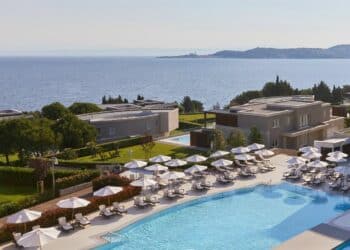Following six years at Zuma, much-talked-about Dubai chef Reif Othman knows what the people want. Having just opened the successful Play Restaurant & Lounge, Othman is on a creative roll as he prepares to introduce a slew of new concepts to the emirate over the next year, the first of which will open next month. Crystal Chesters Reports

Reif Othman took Dubai by storm during his six-year tenure as executive chef of London-founded Japanese brand Zuma, arguably the best restaurant in the region, having been the only one in MENA to make S. Pellegrino’s annual list of the World’s 50 Best Restaurants for four consecutive years from 2012 – 2015. He is now heading up the 40-strong culinary team at recently opened Play Restaurant & Lounge on the 36th floor of the H Hotel on Dubai’s Sheikh Zayed Road – a concept by Othman’s Absolute F&B Facilities Management and Elie Khoury’s Treenergy Management, both of which are under R.A.W Galadari Holding.
Following six years focusing solely on Japanese cuisine, Play has put Othman’s creativity to the test, allowing him to combine his expertise in Asian cuisine and previous experience in Europe, to create a menu concept dubbed “Mediterasian”. The restaurant, which had been open just five weeks at the time of Othman’s interview with Catering News, has been a success so far, averaging 220 covers on weekdays and 300 – 350 on weekends.
“I think it’s word of mouth; people know me and I have some followers, so it’s been great, I’m very happy,” Othman says.
However, the opening didn’t come without teething problems, and Othman admits that already the team is looking to restructure parts of the restaurant. For example, the bar area will be converted into a VIP lounge with large sofas mainly to accommodate smokers, since smoke in the dining area has been a gripe for some guests. Staffing has been another challenge, with many of the team of 130 coming from Europe, and having to adapt to Dubai’s demanding clientele.
Testament to Play’s strength as a concept, however, is the investor interest it has generated already from international markets. A company from Shanghai approached the team with an opportunity, and advanced talks are underway for a Los Angeles outlet, with locations being considered on Rodeo Drive, Malibou and Sunset Boulevard.
“We’re looking at LA, which I think would be the best place to go, but also London. We had an offer to open in Shanghai – I’m surprised because we only opened five weeks ago!” says Othman.
“We’d love to open right now [in LA]. We’ve seen the site, the space, what people want there – and there’s huge potential.”
However, Othman’s first goal is to ensure the restaurant is up to par before the brand leaves Dubai. “I have to make sure we do the right things; that we’re in a good position. Dubai is our base for testing out so that we have confidence. I believe in myself, but nevertheless, we have to make sure we make it right before moving on.”

In addition to bold ambitions for Play – which he would like to see make S. Pellegrino’s Top 50 Best Restaurants list – he also has his sights set on bolstering the Reif Othman brand name. As such, luxury private dining concept, The Experience by Reif Othman, another R.A.W Galadari investment, is currently under construction upstairs from Play on the 37th floor of the H Hotel.
Echoing the idea of a chef’s table, but with a more intimate, homely setting, Othman promises to remain true to his objective of bridging the gap between chef and consumer, rather than sticking up his name on the door and disappearing, as some well-known chefs do.
“I will personally cook for you; it’s my house, my home and everyone is my guest,” Othman explains.
With a capacity of just 12 seats, the outlet only caters to one group at a time. There is no menu, and dishes are prepared on the spot by Othman to ensure the experience is engaging and interactive. A touch of molecular cooking, which Othman practiced at Zuma, will also be added into the mix.
“You sit down with your friends and you enjoy your dinner until you tell me to stop; you won’t know how many courses you’re getting,” he says.
With just three or four staff, including a sommelier, Othman’s priority for The Experience is making it personal so that guests know they will be served by him.
“A lot of chef’s tables are in kitchens, which isn’t so nice – I want to steer away from that. For me it will just be like a private space, like an apartment. All the big chefs just do their own thing but I don’t like that; cooking is my passion.”
Scheduled to open in April, the restaurant’s operating times will be on request, so that guests can book The Experience for lunch, dinner or even late at night.
Ambitious as it sounds, The Experience isn’t the only new concept on the horizon for Othman. A pan-Asian concept, combining Japanese, Taiwanese and Chinese cuisine is also on the agenda for the end of 2016, and Othman is hoping to secure a commercial villa, or a hotel space in Jumeirah, or somewhere on City Walk Phase 2 by Meraas for the first outlet. Toying with names for the brand, Othman it may be called ‘Mooli’, a type of radish, which is a common ingredient in Taiwanese and Japanese cuisine.
“The place is going to be very funky and trendy with a bit of manga on the wall and Chinese cultural references. It will be like the small shops you get in the streets of LA – Dubai doesn’t have those.
“I’ve even designed the takeaway idea with old-school tiffin stackable pots. There’s lots of stuff I want to bring back to educate people; it will be very casual, nothing fancy, just fun dining,” he adds.
And juggling Play with two other new concepts will involve some strategic planning for Othman, who already has a schedule in mind.
“I will run Play until I get the place up to par, and then my head chef Vinh (Nguyen Quang Vinh), will take over and run the place while I open and focus on The Experience. Once it gets going I’ll have a sous chef to run it for a bit while I open the pan-Asian restaurant,” says Othman.
However, Othman is clear that neglecting The Experience is not an option, given that the concept fundamentally relies on his hands-on input.
“I’ll be running around, but I’ll make sure to have more time for The Experience because it’s my name and people will come there for me so it’s not nice to get someone else to cook,” he says. “As much as you want to open lots of places you have to limit yourself.”
Othman’s plans don’t stop there however, and the Singapore-born chef is desperate to open a property in Dubai International Financial Centre (DIFC), where he spent his six years at Zuma. His plan for the location is a Japanese steakhouse that stands out from the throng of American-style steakhouses in the region. The concept is being discussed for a licensed venue, and is scheduled for early next year.

“There are a lot of American steakhouses and they charge a lot of money; I want to break that chain. I want to serve sake, Japanese whisky and a little good quality wine, but that is it.
“I want the main focus to be on the Japanese produce and I already have Summit, a supplier from Japan for the beef, and they will ship the carcass over so that the chef can put on a show butchering the meat in front of the guests,” Othman reveals.
The one barrier he foresees with DIFC however, is the price of rent. “The rent is killing me in DIFC – it’s very expensive. In Dubai it’s ridiculous, even getting a landlord; they just want the money and it’s not always about a long-term partnership,” he says.
Another idea Othman is considering for DIFC is a tapas-style concept, combining Spanish and Japanese cuisines.
“I would love to open a Japanese/ Spanish tapas bar, where the centre would be a Robata grill. Guests would be able to see the chef cooking skewered foods in the centre. I’d like to serve beers from all around the world and sake.”
This is another example of Othman’s love of fusing Mediterranean and Asian food, which he believes is important for appealing to the consumers of the Middle East, where east meets west.
“I’ve been here for more than seven years and I know what people want; I know what guests like. That’s how the food I create suits the culture we have in the market.
“We all have our egos, but I want to make sure my guests come back; I want them to think ‘wow’. In the end, it’s not all about the chef, it’s about having the right balance,” he says.


































































